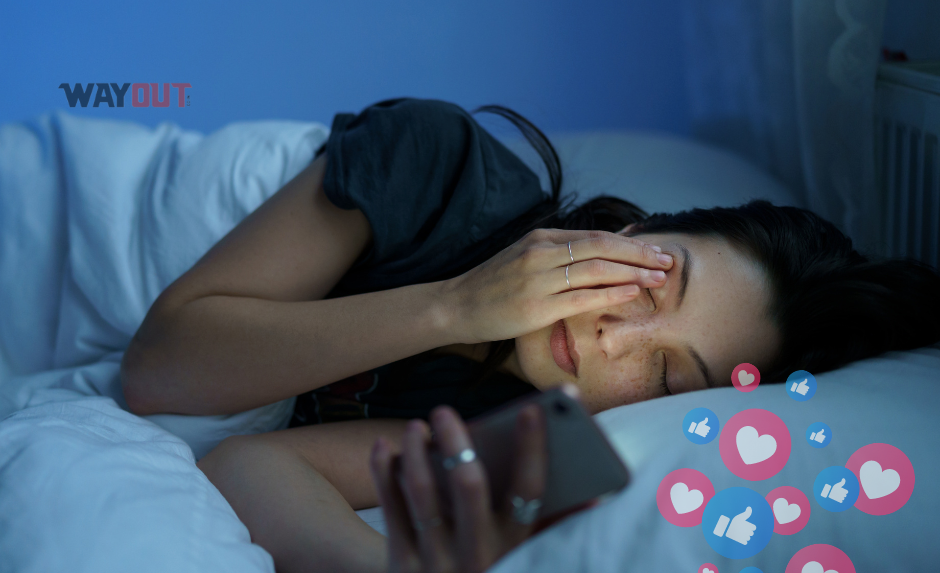Impact of Social Media on Mental Health & its therapeutic solutions

In recent years, social media has become a ubiquitous presence in our daily lives. Platforms such as Facebook, Instagram, and Twitter have changed the way we communicate, share information, and connect with others. However, as the use of social media has grown, so too have concerns about its impact on our mental health has increased. Studies have shown that excessive use of social media can lead to feelings of depression, anxiety, and low self-esteem. In this article, we will cater the impact of social media on mental health, its case study, the therapeutic solutions, etc.
Social media can create a distorted view of reality. On social media, people tend to present an idealized version of themselves and their lives. This can lead to feelings of inadequacy and low self-esteem, particularly for individuals who compare their own lives to the highlight reels of others. Additionally, social media can be a source of constant comparison and competition, which can lead to feelings of inadequacy and depression.
Global study on impact of social media on human life
One study, published in the Journal of Social Psychology, found that individuals who spent more time on social media had higher levels of reported depression and anxiety. The study surveyed 1,787 adults and found that those who spent more than two hours per day on social media had twice the risk of developing depression as compared to those who spent less than 30 minutes per day on social media. Similarly, a study published in the Journal of Social and Clinical Psychology found that high levels of social media use were associated with increased feelings of anxiety, depression, and low self-esteem.
Another potential explanation for the link between social media and mental health is that social media can be a source of constant distraction and interruption. This can lead to feelings of stress and anxiety, as well as difficulty focusing and completing tasks. Additionally, social media can be a source of constant stimulation, which can make it difficult to relax and unwind.
5 dangerous Impact of Social Media on Mental Health
- Depression: Studies have found that excessive use of social media is associated with increased symptoms of depression. This may be due to the constant comparison to others, which can lead to feelings of inadequacy and low self-esteem.
- Anxiety: Social media can also be a source of constant distraction and interruption, which can lead to feelings of stress and anxiety. Additionally, social media can be a source of constant stimulation, which can make it difficult to relax and unwind.
- Low self-esteem: Constant comparison to others on social media can lead to feelings of inadequacy and low self-esteem. Social media can also be a source of constant comparison and competition, which can lead to feelings of inadequacy and depression.
- Cyberbullying: Social media can also be a source of bullying and harassment, which can lead to feelings of fear, anxiety, and depression.
- Sleep disturbance: Excessive use of social media can also lead to sleep disturbance, which can further contribute to feelings of depression and anxiety. Additionally, the blue light emitted from screens can disrupt the production of melatonin, making it harder to fall asleep.
Hazardous case study of Impact of Social Media on Mental Health
- John Case 1: John, a 25-year-old man, spent several hours a day on social media comparing himself to others. He began to feel inadequate and depressed, and eventually sought help from a therapist. Through therapy, John learned to set limits on his social media use and focus on building self-esteem and self-worth.
- Sarah: Case 2: Sarah, a 22-year-old college student, was bullied on social media by her peers. The constant harassment led to feelings of fear, anxiety and depression. She sought help from a therapist and together, they worked to reduce her social media use and build her self-esteem. She also learned coping mechanisms to deal with the negative effects of cyberbullying.
- Michael Case 3: Michael, a 35-year-old man, was addicted to social media, and spent most of his time browsing through it. He began to experience sleep disturbance, which led to feelings of depression and anxiety. He sought help from a therapist and together, they worked to reduce his social media use, improve his sleep habits, and taught him mindfulness techniques to help him relax and unwind.
- Gaurav Case 4: Gaurav, a 40-year-old woman, was constantly comparing herself to others on social media, which led to feelings of inadequacy and low self-esteem. Through therapy, Jane learned to set limits on her social media use and focus on building self-esteem and self-worth. She also re-connected with friends and family in real life and reduced her dependency on social media.
Therapeutic solutions to decrease the Impact of Social Media on Mental Health
Therapeutic solutions to decrease the social media effects on mental health include:
- Setting limits on social media use: This can involve setting specific times of the day for social media use and limiting the amount of time spent on the platforms.
- Mindfulness-based practices: Mindfulness techniques such as meditation and yoga can help individuals become more aware of their thoughts and feelings and reduce feelings of anxiety and depression.
- Cognitive-behavioural therapy (CBT): This form of therapy can help individuals identify and change negative patterns of thinking and behavior, which can help reduce feelings of depression and anxiety.
- Building self-esteem: Engaging in activities that make an individual feel good about themselves, such as exercise, volunteering, and creative expression, can help to increase self-esteem and improve mental well-being.
- Social support: Building a strong support system of friends and family can help individuals feel less alone and more supported, which can help to reduce feelings of depression and anxiety.
- Re-establishing meaningful connections: Encourage individuals to re-connect with friends and family in real life and not just on social media.
- Reducing social media dependency: Encourage individuals to find other ways to fill their time, such as reading, spending time outdoors, or pursuing hobbies.
- Educating on the negative effects of social media: This can help individuals understand the potential negative effects of social media and may motivate them to take steps to reduce their use.
Note: It is important to note that these solutions are not one-size-fits-all and they may vary from person to person. It is important to work with a professional therapist or counselor to determine the best course of action for an individual.
End note:
In conclusion, social media has become an integral part of our daily lives, but it is important to be aware of the potential negative effects it can have on our mental health. Studies have shown that excessive use of social media can lead to feelings of depression, anxiety, and low self-esteem. It's crucial to set limits on social media use and engage in activities that promote self-esteem and well-being.
It is highly encouraged to seek professional help if needed, such as a therapist or counsellor, who can provide guidance and support in addressing the negative Impact of Social Media on Mental Health
Also Read: Rape Culture In India: Social Arrogance Normalizing Rape


 By
By
leave a comment